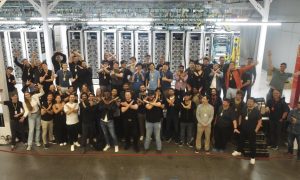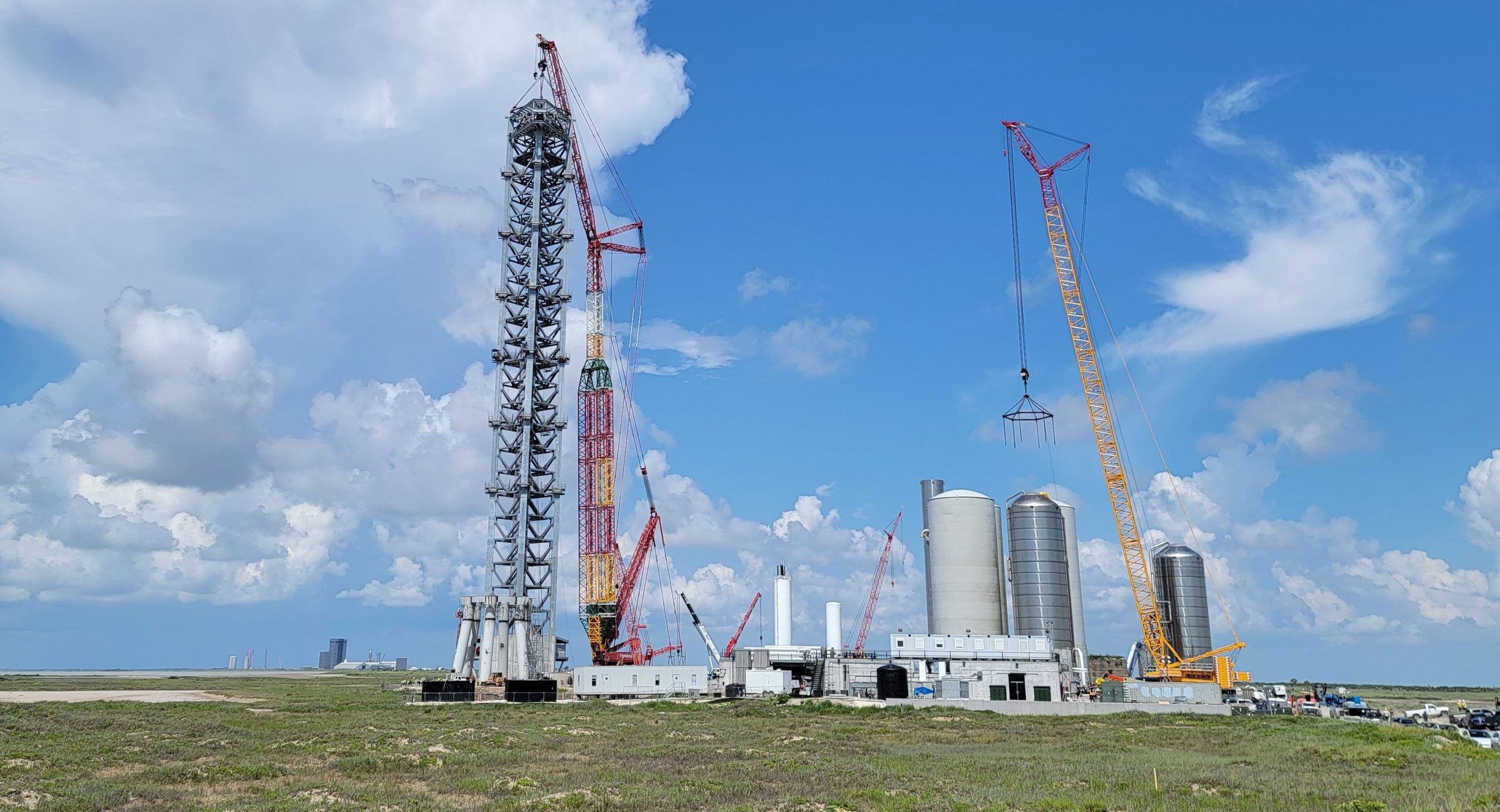

News
SpaceX preparing giant crane to assemble Starship’s first Florida launch tower
SpaceX has begun staging and assembling parts of a giant crane it will soon need to stack Starship’s first East Coast launch tower and install other major launch pad components.
The presence of the base of that crane at SpaceX’s NASA Kennedy Space Center (KSC) Launch Complex 39A was visually confirmed by NASASpaceflight.com photographers during a weekly aerial tour of the area on June 3rd. Four days later, Teslarati photographer Richard Angle observed more major crane components on their way to Pad 39A, including the crane’s cabin.
More likely than not, the crane SpaceX or its contractor has begun assembling at 39A is a Liebherr LR 11350, the same kind of crane the company used to assemble Starship’s first orbital launch site and tower in South Texas. In fact, given how few LR 11350s there are in existence, it’s entirely possible that it’s the exact same crane. Assembly of that crane began around April 2021 and took a month and a half, at which point it was finally ready to lift an extended boom long enough to assemble a tower almost 500 feet (~150 meters) tall.
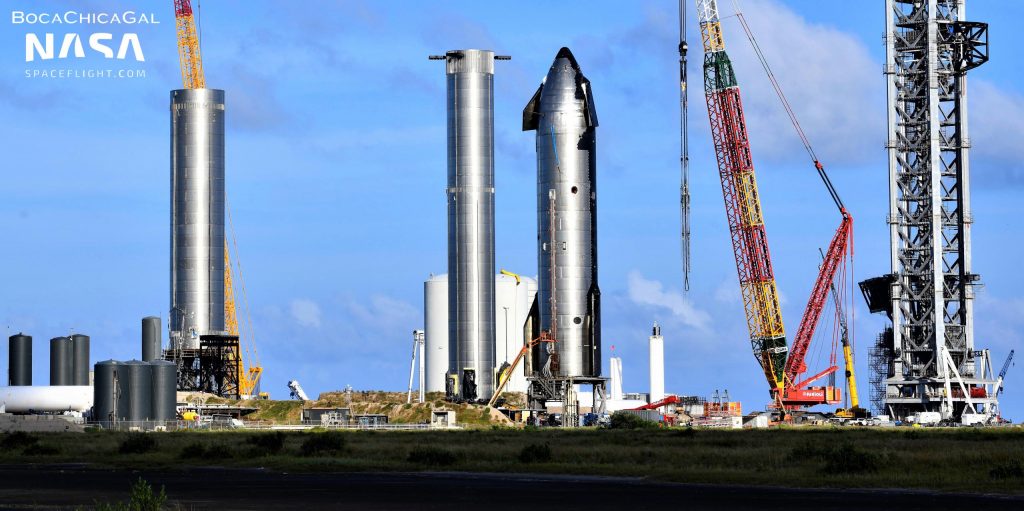
Pad 39A’s Starship launch tower is expected to be very similar to Starbase’s, although it will undoubtedly carry over numerous design changes thanks to lessons learned while building and outfitting the first tower. In fact, SpaceX has already assembled five of the nine individual sections that will eventually be stacked to form that tower, and one such change is already obvious. Instead of stacking each tower section as soon as its barebones framework is complete, SpaceX is taking a more methodical approach to its second launch tower. In an apparent attempt to limit the amount of work that needs to be done at Pad 39A itself, each of those segments is being thoroughly outfitted with secondary structures (ladders, doors, walkways, frames, raceways, etc.) before stacking.
SpaceX may even pre-install most of the thousands of feet of plumbing needed to connect a Starship to ground systems located around 90 meters (~300 ft) below it. Once stacked, each section – including all those partial propellant and gas lines – will still need to be joined together, but that process should be far easier than fully installing all the systems the tower needs to do its job. Outfitting Starbase’s launch tower, for example, took SpaceX around half a year and, to some extent, is still ongoing 11 months after the final stack. That likely explains why Starship’s 39A tower section assembly appears to be taking more time. With any luck, partially combining the outfitting and section assembly stages will significantly expedite final assembly, as far less work will need to be done at extreme heights or require a skyscraper-sized crane.
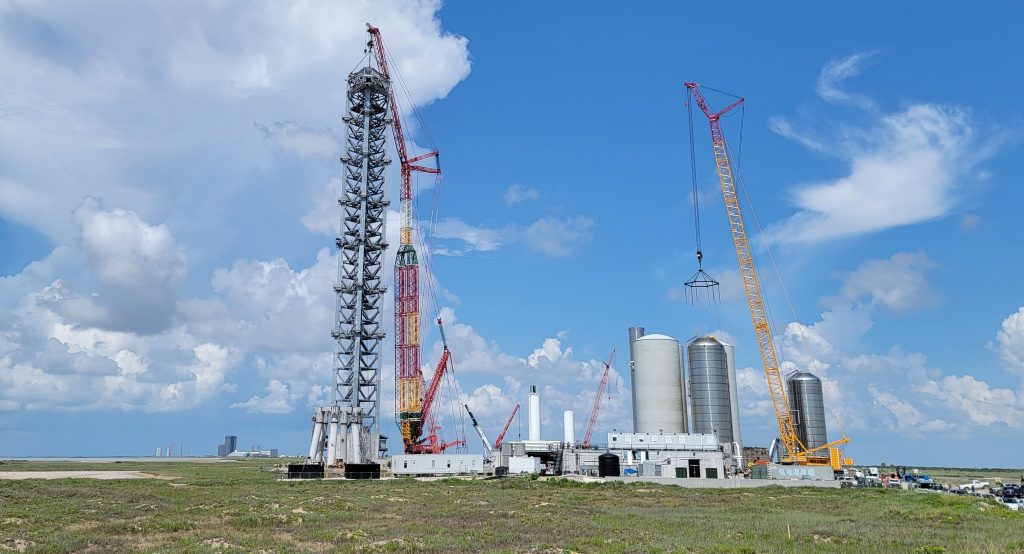
Through Starbase, SpaceX has already demonstrated the ability to stack a Starship launch tower from its unoccupied concrete base to its final height of ~145 meters (~475 ft) in about two months flat. While SpaceX will have to slalom its way around Pad 39A’s busy launch manifest, there’s no reason to believe that Starship’s first Florida launch tower won’t be stacked at least as quickly.
Aside from the arrival of crane parts, SpaceX has also made great progress on the Starship launch site itself. In the last few weeks, the company appears to have completed several significant concrete pours on the tower base. SpaceX has also installed all six of the pedestal-like orbital launch mount’s legs after months of foundation work. Elsewhere at Cape Canaveral, a different team has made excellent progress assembling the massive donut-like platform that will sit on top of those legs. Due to its extreme weight (possibly around 300 metric tons, per Elon Musk’s comments on the Starbase mount), the same LR 11350 crane will also be needed for that major installation milestone.
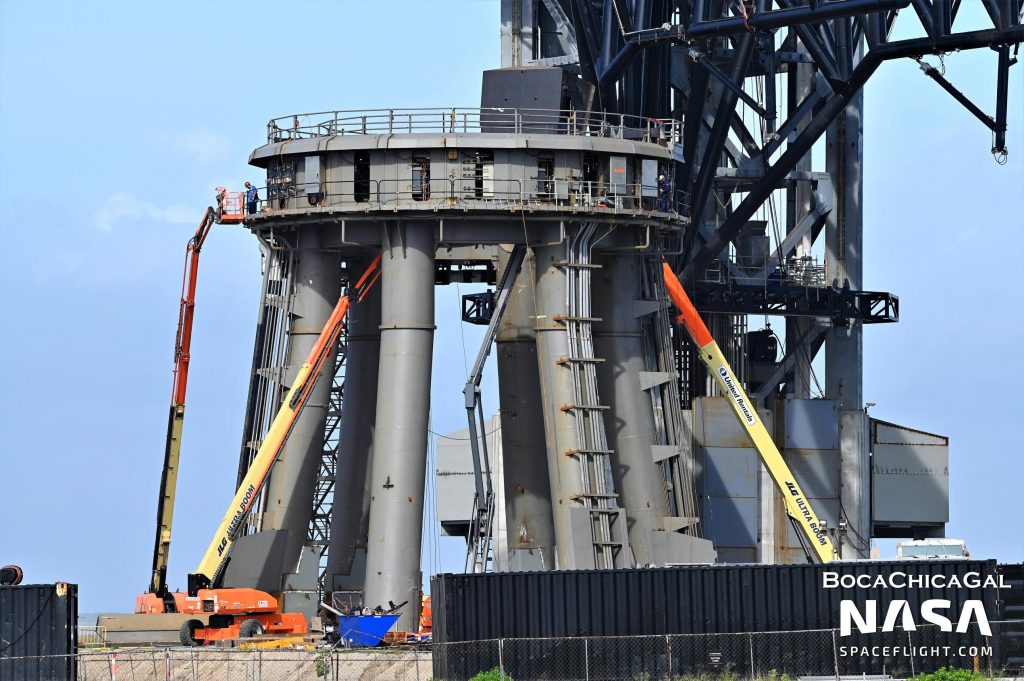
Plenty of parts are still missing, of course. Four tower sections still need to be assembled. Starship’s first Florida launch tower will need its own set of two ‘chopstick’ arms for lifting and (maybe) catching Starship and Super Heavy, as well as a third swinging quick-disconnect arm to connect Starship to ground systems. Aside from delivering several new tanks, SpaceX has also made no apparent progress on adding a massive methane propellant farm to Pad 39A, and it’s possible that the pad’s oxygen farm will also need to be expanded. Propellant storage has proven to be a major headache for SpaceX at Starbase.
Nonetheless, SpaceX is making great progress on most of the most difficult parts of Starship’s first Florida launch site, and there’s a good chance that just like its launch mount, work on the pad’s tower arms is already underway somewhere offsite. A great deal of work remains to be done but SpaceX is still well on its way to launching Starships out of Kennedy Space Center in the not-too-distant future.
Elon Musk
Tesla Supercharger Diner food menu gets a sneak peek as construction closes out
What are you ordering at the Tesla Diner?

The Tesla Supercharger Diner in Los Angeles is nearing completion as construction appears to be winding down significantly. However, the more minor details, such as what the company will serve at its 50s-style diner for food, are starting to be revealed.
Tesla’s Supercharger Diner is set to open soon, seven years after CEO Elon Musk first drafted the idea in a post on X in 2018. Musk has largely come through on most of what he envisioned for the project: the diner, the massive movie screens, and the intended vibe are all present, thanks to the aerial and ground footage shared on social media.
We already know the Diner will be open 24/7, based on decals placed on the front door of the restaurant that were shared earlier this week. We assume that Tesla Optimus will come into play for these long and uninterrupted hours.
The Tesla Diner is basically finished—here’s what it looks like
As far as the food, Tesla does have an email also printed on the front door of the Diner, but we did not receive any response back (yet) about what cuisine it will be offering. We figured it would be nothing fancy and it would be typical diner staples: burgers, fries, wings, milkshakes, etc.
According to pictures taken by @Tesla_lighting_, which were shared by Not a Tesla App, the food will be just that: quick and affordable meals that diners do well. It’s nothing crazy, just typical staples you’d find at any diner, just with a Tesla twist:
Tesla Diner food:
• Burgers
• Fries
• Chicken Wings
• Hot Dogs
• Hand-spun milkshakes
• And more https://t.co/kzFf20YZQq pic.twitter.com/aRv02TzouY— Sawyer Merritt (@SawyerMerritt) July 17, 2025
As the food menu is finalized, we will be sure to share any details Tesla provides, including a full list of what will be served and its prices.
Additionally, the entire property appears to be nearing its final construction stages, and it seems it may even be nearing completion. The movie screens are already up and showing videos of things like SpaceX launches.
There are many cars already using the Superchargers at the restaurant, and employees inside the facility look to be putting the finishing touches on the interior.
🚨 Boots on the ground at the Tesla Diner:
— TESLARATI (@Teslarati) July 17, 2025
It’s almost reminiscent of a Tesla version of a Buc-ee’s, a southern staple convenience store that offers much more than a traditional gas station. Of course, Tesla’s version is futuristic and more catered to the company’s image, but the idea is the same.
It’s a one-stop shop for anything you’d need to recharge as a Tesla owner. Los Angeles building permits have not yet revealed the date for the restaurant’s initial operation, but Tesla may have its eye on a target date that will likely be announced during next week’s Earnings Call.
News
Tesla’s longer Model Y did not scale back requests for this vehicle type from fans
Tesla fans are happy with the new Model Y, but they’re still vocal about the need for something else.

Tesla launched a slightly longer version of the Model Y all-electric crossover in China, and with it being extremely likely that the vehicle will make its way to other markets, including the United States, fans are still looking for something more.
The new Model Y L in China boasts a slightly larger wheelbase than its original version, giving slightly more interior room with a sixth seat, thanks to a third row.
Tesla exec hints at useful and potentially killer Model Y L feature
Tesla has said throughout the past year that it would focus on developing its affordable, compact models, which were set to begin production in the first half of the year. The company has not indicated whether it met that timeline or not, but many are hoping to see unveilings of those designs potentially during the Q3 earnings call.
However, the modifications to the Model Y, which have not yet been officially announced for any markets outside of China, still don’t seem to be what owners and fans are looking forward to. Instead, they are hoping for something larger.
A few months ago, I reported on the overall consensus within the Tesla community that the company needs a full-size SUV, minivan, or even a cargo van that would be ideal for camping or business use.
Tesla is missing one type of vehicle in its lineup and fans want it fast
That mentality still seems very present amongst fans and owners, who state that a full-size SUV with enough seating for a larger family, more capability in terms of cargo space for camping or business operation, and something to compete with gas cars like the Chevrolet Tahoe, Ford Expedition, or electric ones like the Volkswagen ID.BUZZ.
We asked the question on X, and Tesla fans were nearly unanimously in support of a larger SUV or minivan-type vehicle for the company’s lineup:
🚨 More and more people are *still* saying that, despite this new, longer Model Y, Tesla still needs a true three-row SUV
Do you agree? https://t.co/QmbRDcCE08 pic.twitter.com/p6m5zB4sDZ
— TESLARATI (@Teslarati) July 16, 2025
Here’s what some of the respondents said:
100% agree, we need a larger vehicle.
Our model Y is quickly getting too small for our family of 5 as the kids grow. A slightly longer Y with an extra seat is nice but it’s not enough if you’re looking to take it on road trips/vacations/ kids sports gear etc.
Unfortunately we…
— Anthony Hunter (@_LiarsDice_) July 17, 2025
Had to buy a Kia Carnival Hybrid because Tesla doesn’t have a true 3 row vehicle with proper space and respectable range. pic.twitter.com/pzwFyHU8Gi
— Neil, like the astronaut (@Neileeyo) July 17, 2025
Agreed! I’m not sure who created this but I liked it enough to save it. pic.twitter.com/Sof5nMehjS
— 🦉Wise Words of Wisdom – Inspirational Quotes (IQ) (@WiseWordsIQ) July 16, 2025
Tesla is certainly aware that many of its owners would like the company to develop something larger that competes with the large SUVs on the market.
However, it has not stated that anything like that is in the current plans for future vehicles, as it has made a concerted effort to develop Robotaxi alongside the affordable, compact models that it claims are in development.
It has already unveiled the Robovan, a people-mover that can seat up to 20 passengers in a lounge-like interior.
The Robovan will be completely driverless, so it’s unlikely we will see it before the release of a fully autonomous Full Self-Driving suite from Tesla.
Energy
Tesla launches first Virtual Power Plant in UK – get paid to use solar
Tesla has launched its first-ever Virtual Power Plant program in the United Kingdom.

Tesla has launched its first-ever Virtual Power Plant program in the United Kingdom. This feature enables users of solar panels and energy storage systems to sell their excess energy back to the grid.
Tesla is utilizing Octopus Energy, a British renewable energy company that operates in multiple markets, including the UK, France, Germany, Italy, Spain, Australia, Japan, New Zealand, and the United States, as the provider for the VPP launch in the region.
The company states that those who enroll in the program can earn up to £300 per month.
Tesla has operated several VPP programs worldwide, most notably in California, Texas, Connecticut, and the U.S. territory of Puerto Rico. This is not the first time Tesla has operated a VPP outside the United States, as there are programs in Australia, Japan, and New Zealand.
This is its first in the UK:
Our first VPP in the UK
You can get paid to share your energy – store excess energy in your Powerwall & sell it back to the grid
You’re making £££ and the community is powered by clean energy
Win-win pic.twitter.com/evhMtJpgy1
— Tesla UK (@tesla_uk) July 17, 2025
Tesla is not the only company that is working with Octopus Energy in the UK for the VPP, as it joins SolarEdge, GivEnergy, and Enphase as other companies that utilize the Octopus platform for their project operations.
It has been six years since Tesla launched its first VPP, as it started its first in Australia back in 2019. In 2024, Tesla paid out over $10 million to those participating in the program.
Participating in the VPP program that Tesla offers not only provides enrolled individuals with the opportunity to earn money, but it also contributes to grid stabilization by supporting local energy grids.
-

 Elon Musk1 day ago
Elon Musk1 day agoWaymo responds to Tesla’s Robotaxi expansion in Austin with bold statement
-

 News1 day ago
News1 day agoTesla exec hints at useful and potentially killer Model Y L feature
-

 Elon Musk2 days ago
Elon Musk2 days agoElon Musk reveals SpaceX’s target for Starship’s 10th launch
-

 Elon Musk3 days ago
Elon Musk3 days agoTesla ups Robotaxi fare price to another comical figure with service area expansion
-

 News1 day ago
News1 day agoTesla’s longer Model Y did not scale back requests for this vehicle type from fans
-

 News2 days ago
News2 days ago“Worthy of respect:” Six-seat Model Y L acknowledged by Tesla China’s biggest rivals
-

 News2 days ago
News2 days agoFirst glimpse of Tesla Model Y with six seats and extended wheelbase
-

 Elon Musk2 days ago
Elon Musk2 days agoElon Musk confirms Tesla is already rolling out a new feature for in-car Grok


